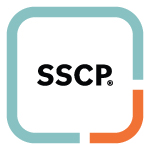As the true entry point to career excellence, a SSCP starts newcomers on their path to Systems Security Certified Practitioner and future leadership roles.

The SSCP is designed for cybersecurity and IT/ICT professionals who have hands-on responsibility for designing, implementing and maintaining cyber, information, software and infrastructure security, whether in a cyber-dedicated role or as part of their day-to-day IT/ICT position. Roles include:
Every IT organization should have SSCPs as part their team. Strong areas of focus are the SOC within an organization and MSPs, including specialized SOC service providers.
Exam Availability: English | Testing Centre: Pearson VUE
Exam Length
Item Format
Passing Score
Course Fee
Exam Fee $380 (AUD)
See alternate Associate pathway for those who do not yet meet experience requirement
Find a local Pearson VUE Test Center and register for the exam at www.pearsonvue.com/isc2
Validates knowledge and experience. It’s a way to be taken more seriously.
Can lead to higher pay, promotions, more complex work, exciting challenges, project lead roles and better jobs.
Helps individuals develop new skills they can apply in day-to-day work and stay up-to-date on emerging threats.
Builds a strong foundation for an infosec career and helps individuals get familiar with the format of (ISC)2 exams (such as CISSP).
Helps individuals understand the business side of things and apply real-world knowledge across platforms.
Enables access to a network of peers and access to CPE/learning opportunities.
Depending on country and employer. On average, (ISC)² members report having 35% higher salaries than non-members.
Strengthen the security posture with qualified practitioners who have proven hands-on technical ability to competently handle day-to-day operations.
Implement the latest security best practices to protect the organization from ever-increasing levels of cyber risk.
Ensure professionals speak the same language across disciplines and have cross-department perspective.
Increase organizational integrity in the eyes of clients and other stakeholders.
Meet certification requirements and recommendations for government, service providers and subcontractors.
Ensure professionals are up-to-date on emerging and changing technologies, and security issues related to these technologies through (ISC)² CPE requirements.
Comply with government or industry regulations (DoD 8140.01/8570.01 approved).


